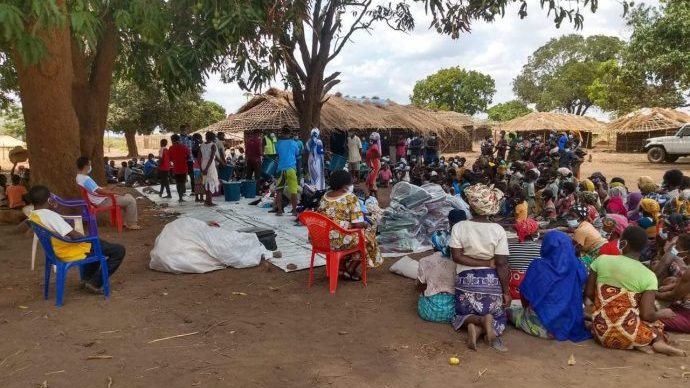Attacks by insurgents against civilians in northern Mozambique have already forced more than 400,000 people to leave the conflict zone.
The humanitarian crisis Cabo Delgado province has escalated in the past few weeks, when rebels – who claim to be connected to the Islamic State – raided 14 villages in Muidumbe district.
“It’s a district where almost all villages have already suffered attacks. All the people left it and came to the South,” Brazilian-born Bishop Luiz Fernando Lisboa of Pemba told Crux.
It was reported at the beginning of November that 50 people were decapitated in a local soccer field, although Cabo Delgado’s government denied the report.
The Portuguese-language news website Voa Português confirmed the story with witness testimony from those who fled the mass killings.
In another area, 20 young men who were attending an initiation ritual were killed and mutilated.
The new flood of internally displaced people fleeing the insurgents join another 14,000 people who have arrived in Pemba by boat since October, when coastal areas and islands in the North were reached by the Islamists.
“On October 16, people began to arrive in more than 250 boats. For 21 days, the beach in Pemba was crowded with refugees, till the local government sent everybody to the houses of families or to other districts,” Manuel José Nota, the diocesan Caritas director in Pemba, told Crux.
Caritas has been working to help the refugees on the beach since their arrival, Nota said, taking care of hygienic conditions in the area, distributing food and supporting health services.
“When the evacuation began, we rented trucks to take the people to neighboring districts,” Nota added.
Now, there are 100,000 refugees from the violence in Pemba alone, most of them in need of food, medicines, and adequate shelter.
“In our province, there are now 400,000 refugees. Each district has at least 30,000 of them,” Lisboa said.
Humanitarian organizations and the Church have been working to avoid widespread hunger among the displaced.
“We’ve been helped by international Caritas organizations, like the American, the Spanish, and the Portuguese, and by specific dioceses of Spain, for instance,” the Brazilian-born Sister Aparecida Ramos Queiroz told Crux.
Despite all help, available resources have not been enough to deal with the situation, Lisboa said.
“We have many people engaged in helping with the crisis and money is always arriving, but the necessities are gigantic,” the bishop said.
Refugee camps are being structured to welcome part of the newcomers, but many people are still overcrowding the homes in local villages.
“I have visited houses where 58 people were living. In a room projected for five people, there were 20,” Nota said.
The diocesan Caritas has been distributing food kits for families with more than 20 members.
The large agglomerations may increase the risks of contagion with the novel coronavirus, Queiroz said.
“Social distancing measures are absolutely impossible in such context. Many people don’t wear masks,” she said.
Nota confirmed that the cases of COVID-19 have been growing in Pemba, but only two people so far have died.
In November 13, the United Nations High Commissioner for Human Rights Michelle Bachelet declared that the Mozambican authorities must “ensure the protection of civilians inside and outside the conflict-affected areas and that humanitarian agencies are guaranteed safe, unhindered access to deliver life-saving assistance and protection.”
“This is particularly crucial given the risk of cholera and the spread of the COVID-19 pandemic,” she added.
According to Lisboa, the Church has been raising awareness on the pandemic and distributing masks and hygiene kits, but “the risks are high.”
“There’s already community contagion in Cabo Delgado. It’s the province with the third most cases in Mozambique,” he said.
Mental health is another main issue, said Queiroz. She’s been coordinating the pastoral and psychological care teams since the beginning of the crisis.
“People have experienced terrible violence. They saw their family members and neighbors dying and had to leave all their possessions behind when they fled the conflict zone. They have many emotional scars,” she said.
Brazilian-born Father Pedrinho Secretti, whose parish is in the border with Nampula Province, said that at least 1,600 refugees already arrived in the area, which is more than 250 miles from the conflict zone.
“We’re helping them with resources from the diocesan Caritas. People are now building houses with local materials. In December, the rainy season begins, and things may become even more difficult,” he told Crux.
Secretti said that the insurgents have spread the news that they have members in every district in Cabo Delgado, so everybody fears that new attacks might happen in what are now peaceful regions.
Amid so many stories of death and violence, a few events sometimes give him hope, Secretti said.
“One of the people who arrived here was a pregnant woman who managed to flee the conflict. She doesn’t know where her husband is, but at least she arrived here in safety,” he said.
The woman was living under a mango tree and her baby daughter Rosa was born there.
“Now she has her own house,” Secretti added.
Lisboa said that the situation is very uncertain, and nobody knows when the conflict may stop.
“Even if the attacks ended now, it would take several years to rebuild everything that was destroyed,” the bishop said.

